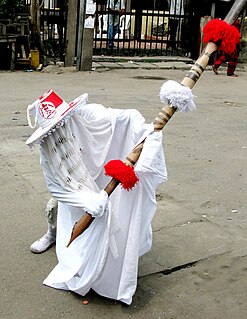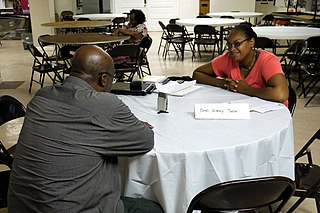
Lagos is a city in the Nigerian state of Lagos. The city, with its adjoining conurbation, is the most populous in Nigeria, and the most populous on the African continent. It is one of the fastest growing cities in the world, and also one of the most populous urban agglomerations. Lagos is a major financial centre in Africa; the megacity has the highest GDP, and also houses one of the largest and busiest seaports on the continent.

In Nigeria, a state is a federated political entity that shares sovereignty with the federal government. There are 36 states bound together by a federal agreement. The Federal Capital Territory is not a state and under the direct control of the federal government. The states are further divided into a total of 774 Local Government Areas. Under the Nigerian Constitution, states have the power to ratify constitutional amendments.

The Igbo people are an ethnic group native to the present-day south-central and southeastern Nigeria. Geographically, the Igbo homeland is divided into two unequal sections by the Niger River – an eastern and a western section. The Igbo people are one of the largest ethnic groups in Africa.

Ife is an ancient Yoruba city in south-western Nigeria. The city is located in present day Osun State. Ife is about 218 kilometers northeast of Lagos with a population of 509,813. Ife was created by Yoruba religion which accordingly was the order of the Supreme God Olodumare to Obatala, eventually falling into the hands of his brother Oduduwa which created turmoil between the two Oduduwa created his own dynasty through his sons and daughters that became different rulers of many kingdoms. The first Oòni of Ife is a descendant of Oduduwa, which was the 401st Orisha. The present ruler since 2015 is Oba Adeyeye Enitan Ogunwusi Ojaja II, Ooni of Ife who is also a Nigerian accountant. Named as the city of 401 deities Ife is home to many worshipers of these deities which also are celebrated through festivals. Along with the culture of Ife, their beliefs extend along the concept of the Ase, which help make art of the Kings and Gods. Ilé-Ifè is famous worldwide for its ancient and naturalistic bronze, stone and terracotta sculptures, dating back to between 1200 and 1400 A.D.

Port Harcourt is the capital and largest city of Rivers State, Nigeria. It lies along the Bonny River and is located in the Niger Delta. As of 2016, the Port Harcourt urban area has an estimated population of 1,865,000 inhabitants, up from 1,382,592 as of 2006.
Elechi Amadi was a former member of the Nigerian Armed Forces. He was an author of plays and novels that are generally about African village life, customs, beliefs, and religious practices prior to contact with the Western world. Amadi is best regarded for his 1966 debut novel, The Concubine, which has been called "an outstanding work of pure fiction".
Otonti Amadi Nduka is a Nigerian educationalist and Ikwerre ethnic nationality spokesman. He is married to Pamela Nduka and together they have 5 children. Otonti and his wife are still currently residing in Nigeria.
Charles Chukwuma Soludo, CFR is a Nigerian economics professor and a former Governor and chairman of the board of directors of the Central Bank of Nigeria (CBN). Chukwuma was named Governor on 29 May 2004. Charles is also a member of the British Department for International Development's International Advisory Group.
The Ekpeye are a people in southeastern Nigeria with a distinct culture and rulers of a former kingdom. The Ekpeye are usually included as a subgroup of the Igbo people on linguistic and cultural grounds. They speak an Igboid language. Ekpeye people live in the Ahoada (Ahuda) Ogba-Egbema and Ohaji-Egbema areas of Rivers State and Imo State in Nigeria.
This is a timeline of Nigerian history, comprising important legal and territorial changes and political events in Nigeria and its predecessor states. To read about the background to these events, see History of Nigeria. See also the list of heads of state of Nigeria.

The Yorùbá people are an African ethnic group that inhabits western Nigeria. The Yoruba constitute about 44 million people in total. Majority of this population is from Nigeria, where the Yorùbá make up 21% of the country's population, according to the CIA World Factbook, making them one of the largest ethnic groups in Africa. Most Yoruba people speak the Yoruba language, which is tonal, and is the language with the largest number of native speakers.

The Eyo Festival, otherwise known as the Adamu Orisha Play, is a Yoruba festival unique to Lagos, Nigeria. In modern times, it is presented by the people of Lagos as a tourist event and due to its history, is traditionally performed on Lagos Island.

Toyin Omoyeni Falola is a Nigerian historian and professor of African Studies. He is currently the Jacob and Frances Sanger Mossiker Chair in the Humanities at the University of Texas at Austin. Falola earned his B.A. and Ph.D. (1981) in History at the University of Ife, Ile-Ife, in Nigeria. He is a Fellow of the Historical Society of Nigeria and of the Nigerian Academy of Letters. Falola is author and editor of more than one hundred books, and he is the general editor of the Cambria African Studies Series.
The University of Port Harcourt is a university in the Nigerian city of Port Harcourt. It was established in 1975 as University College, PorHarcourt and was given University status in 1977. The University of Port Harcourt was ranked the sixth in Africa and the first in Nigeria by Times Higher Education (THE) in 2015.
Christopher Alexander Sapara Williams CMG (1855–1915) was the first indigenous Nigerian lawyer, called to the English bar on 17 November 1879. In addition to his legal practice, he came to play an influential role in the politics of Nigeria during the colonial era. Williams was the elder brother of Oguntola Sapara, who became a prominent physician.
Alex Ibru was a Nigerian businessman, founder and publisher of The Guardian newspaper, who was Minister of Internal Affairs from 1993 to 1995 during the military regime of General Sani Abacha.
The following is a timeline of the history of the metropolis of Lagos, Nigeria.
This is a timeline of the history of Port Harcourt, the capital of Rivers State, Nigeria.
The following is a timeline of the history of the city of Kano, Nigeria.

Sir Kitoye Ajasa was a Nigerian lawyer and legislator during the colonial period. He was conservative, and worked closely with the colonial authorities. He thought that progress would only be possible if Africans adopted European ideas and institutions. Ajasa was one of the leaders of the People's Union, the first political party in Nigeria, and was the founder of the conservative newspaper the Nigerian Pioneer. He was the first Nigerian to be knighted.










